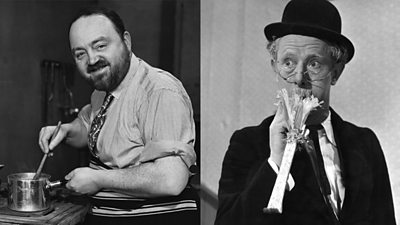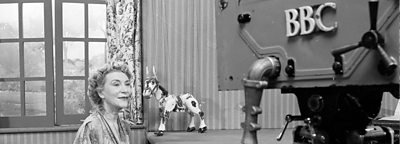The euphoria after the relaunch was short-lived. For the next five years the service would struggle to find its feet. The 大象传媒 could not justify heavy investment in television when only a few could enjoy it, and there was in any case little in the way of spare resources. Thus it was two years before work began on the first of the regional transmitters, Sutton Coldfield.
Moreover, the 'fools on the hill' (as the television staff were sometimes referred to) were made to feel second-class citizens within the Corporation. The service was one of six units managed under the director of Home Broadcasting.
Television was rarely discussed by the Governors, and director-general William Haley was more concerned with the launch of the Third Programme (forerunner to Radio 3) than with what was happening in north London. Worse, some radio producers actively discouraged artists from appearing on television.
Adding to television's troubles was a new, tougher attitude towards the service from those who felt threatened by it - notably the film and theatre industries, and the owners of sports rights. British Movietone refused to allow the 大象传媒 to have a copy of its film of the relaunch of the television service, and by the end of the 1946 Disney had withdrawn permission to show its cartoons.
Theatres refused to co-operate as they had before the war, when entire West End casts went to Alexandra Palace to perform before the cameras, and the 大象传媒 was denied access to league football and the Grand National. Even some churches refused the 大象传媒 access on the grounds that television might damage attendances.
And then there was the weather. The bitter winter of 1946/47 resulted in a fuel crisis, a casualty of which was television. It closed for a whole month, and was rationed to evening transmissions only for seven weeks thereafter.

But despite their tribulations the staff sustained an increasingly varied schedule. The pre-war Picture Page, which was to endure until 1952, was soon surrounded with new programmes and new faces - including Muffin The Mule, Woman's Magazine, Kaleidoscope, the comedian Richard Hearne, chef Philip Harben, gardener Fred Streeter, and entertainers Petula Clark, the Beverley Sisters and Jimmy Edwards.
Documentaries such as Magistrates' Court followed the appointment of the first TV documentary writer (Duncan Ross), and despite their differences, the television and radio arms of the 大象传媒 did co-operate on occasions to bring to the small screen sound shows such as Those Were the Days and Twenty Questions.
Eighteen months after the re-start, the Corporation finally came to terms with television news. For years Broadcasting House had ruled that news in vision would be inappropriate. The slightest facial movement on the part of the newsreader would be interpreted as comment, the executives argued.
But viewers, who in 1938 had glimpsed the possibilities when cameras showed Prime Minister Neville Chamberlain announcing his 'peace for our time' pact with Hitler, felt otherwise. Pressure from outside, as well as from the staff at Alexandra Palace, began to grow, and eventually director-general William Haley relented. In January 1948 Newsreel, a weekly bulletin of filmed reports, was launched.
